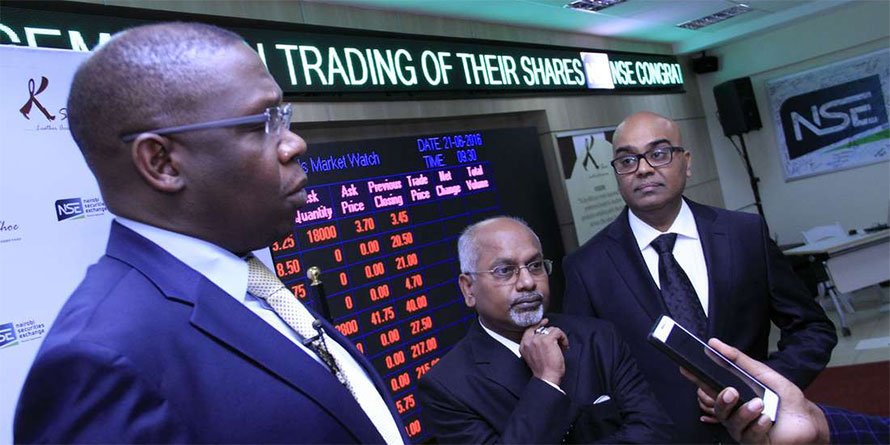NSE chief executive Geoffrey Odundo (left) with Nairobi Business Ventures executives Vasu Abotula (centre) and Raj Srungarapu during a bell ringing ceremony. PHOTO | DIANA NGILA | NMG It is said that even the most successful businesses have failed at some point in time. Companies that are financially stable today may not be so tomorrow. Equally, many companies that are financially unstable today may have a turnaround strategy that propels them to success.
Handled correctly, rock bottom could serve as the first stepping stone a company needs to begin climbing back up to the top. This is the lesson learnt from the recent restructuring of the Nairobi Business Ventures Limited (NBV) through the injection of capital in exchange for equity by a strategic investor, Delta International FZE.
Listed by introduction on the Growth and Enterprise Market Segment of the Nairobi Securities Exchange (NSE) in 2016, NBV experienced significant financial distress that saw the company that had over 20 outlets in prime locations in Nairobi face liquidation from landlords and eventually close all its physical outlets.
The company resorted to e-commerce, which also failed. The audited financial statements of the company for the year ended March 31, 2019 indicated a drop in sales to a meagre Sh13.2 million and a worsening negative equity due to loss of stock and fixed assets.
In November 2020, NBV was suspended from trading on the NSE to allow the conclusion of the restructuring process. At that time, its shares were trading at a low of Sh0.71 each, with a market capitalisation of Sh27.6 million and 38,600,000 shares in issue.
At the close of year 2020 when the restructuring exercise was concluded, NBV share price had shot by more than 490 percent, largely due to the restructuring that included a share and price split, allotment and issuance of new shares to Delta International FZE. Today, the company’s share is trading at aroundSh4.87 each, with a market capitalisation of Sh2.4 billion and 492,200,000 shares in issue.
The last two years culminating into the conclusion of the transaction saw a myriad of activities, discussions and negotiations between NBV, capital markets regulators, transaction advisors, creditors and shareholders.
From the NBV story, the following lessons emerge: Market solutions for distressed companies exist
There are investors who specialise in acquiring companies in financial distress especially where due diligence gives them confidence in the structures and viability of the company. The business of these investors is to buy […]
